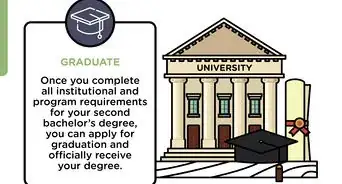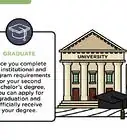This article was co-authored by Katherine Demby and by wikiHow staff writer, Eric McClure. Katherine Demby is an Academic Consultant based in New York City. Katherine specializes in tutoring for the LSAT, GRE, SAT, ACT, and academic subjects for high school and college students. She holds a BA in History and Political Science from the University of North Carolina at Chapel Hill and a JD from Yale Law School. Katherine is also a freelance writer and editor.
There are 9 references cited in this article, which can be found at the bottom of the page.
This article has been viewed 12,786 times.
An associate's degree is a post-secondary degree that typically takes 2 years to complete. They are less specialized than a 4-year degree, and can be used to transfer to a 4-year university or apply for jobs in a variety of fields. Whether you want to start your career, or simply save some money before transferring to a 4-year university, an associate's degree can be an excellent alternative to a standard bachelor's degree after graduating high school.
Steps
Choosing to Get an Associate's Degree
-
1Research your career path to see if an associate's degree is acceptable. Some careers don't require a bachelor's degree and won't necessarily care if a potential employee has one. Dental hygienists, medical assistants, and engineering technicians are all positions that you can get with an associate's degree and the proper job training.[1]
- A lot of careers that focus on assistance only require an associate's degree. For example, a medical assistant doesn't need a medical degree. They do require post-secondary educational experience though.
-
2Get an associate's if you aren't sure you want to pursue a bachelor's degree yet. If you know that you want an advanced degree but aren't sure about committing to a 4-year program, consider signing up for an associate's program. It will cover a wide range of topics in the coursework and give you a post-secondary degree that you can put on future resumes and job applications.[2]
- An associate's degree will expose you to a variety of subjects. This may give you the experience needed to figure out what you want to major in at a 4-year university.
Tip: Any potential job that requires “some college” will accept an associate's degree. While an associate's degree is a degree that you earn at a college, it isn't technically a collegiate degree. It does, however, count as collegiate experience.
Advertisement -
3Save money on a bachelor's degree by getting your associate's first. Most associate programs have an articulation agreement, which is an established understanding with 4-year institutions that their associate's degree will transfer to cover a university's general education requirements. Get an associate's degree if you want to save money on tuition at a college or university.[3]
- You have to research an associate program to see if they have an articulation agreement with the board of higher education where you live. Some programs won't transfer your credits.
-
4Compare programs to determine which ones are respected in your industry. If you're going to get an associate's degree in medical coding, but a program only offers degrees in the liberal arts, that program isn't going to be a good fit for you. Look up the highest-rated associate's degrees in your field to see which schools will be helpful for your specific career goals.[4]
- Look up a school's faculty to see what they've written or researched. A school's faculty will give you a good indication of what their classes may be like.
Earning Your Associate's
-
1Go to your local community college and ask for an application. Associate's degrees are offered at almost all community colleges. Call your local community college or go to their admission's office and ask for information about their associate programs. Once you've found a school that fits your career goals, lifestyle, and financial requirements, fill out an application to apply.
- Most community colleges have open enrollment, which means that anyone with a high school degree can sign up for classes.
- While community college is often much cheaper than a traditional 4-year university, there is usually a small fee for each class that you sign up for. You'll also have to pay for any books that are required by your professors.
- Community colleges have financial aid offices, just like 4-year universities.
- Attend an open house for your local community college to get more information about the associate programs that they offer.
-
2Apply for an online program if you can't attend traditional classes. Enroll in an online associate's program if you have a day job, kids, or don't happen to live close to a community college. Online programs offer coursework that can be completed from home. Often, classes can be molded to fit your schedule and completed at your own pace. Research a program to see if it offers the classes and scheduling options based on your personal needs.[5]
- Online programs are typically more expensive than a community college program, but they offer you the ability to work from home or late at night.
- Online programs usually cost more money than a community college, but less money than a traditional 4-year university.
Warning: Make sure that you research an online program if you plan on transferring to a traditional 4-year university. Some universities don't accept online degrees, especially if they aren't based in the state that you live in.
-
3Inquire about an associate's degree at a 4-year university. If you want an associate's degree because you want the extra degree or need a specific associate's certification for your career path, you can complete it while pursuing a 4-year bachelor's degree at some colleges. Apply to a college that offers a simultaneous-degree course path that offers both the associate's that you want and the major that you want to pursue.[6]
- Getting an associate's degree at a 4-year university or college will be a lot more expensive, but you won't need to worry about getting your credits transferred.
- Being able to complete your associate's and bachelor's degrees at the same time will keep you from taking extra or non-accredited classes in an associate's program.
-
4Choose between an associate in art, science, or applied science. Associate's degrees aren't as specialized as bachelor's degrees, since they require courses in a variety of topics to give students a well-rounded education. However, different associate degrees do emphasize different fields of study. Choose an associate degree based on what you plan on pursuing in your career or college studies.[7]
- An associate in art will take more classes in fields related to the liberal arts, like English literature, history, or philosophy.
- An associate of science degree will require more classes in mathematics, biology, chemistry, or physics.
- An associate degree in applied sciences will emphasize specialized classes required for specific careers. For example, an associate degree in applied sciences may focus on aviation, dentistry, or construction.
-
5Complete your classes and do as well as you can. Each semester, take the required classes as suggested by your school counselor or class path. Study hard, complete your homework, and consult your professors periodically to ensure that you're on track to graduate on time.[8]
- Associate programs usually offer the same resources that are available to regular college students. If you're struggling in a class, consult your school's tutoring program or writing center.
Tip: Professors in associate programs usually hold office hours the same way that undergraduate professors do, even in online programs! Drop in with a professor if you find yourself struggling to complete an assignment.
-
6Don't assume that associate classes will be easier than standard college classes. Many students make the mistake of treating associate classes like they're high school classes. The reality is that associate degrees are post-secondary degrees, and the classwork will be rigorous and require a lot of time and effort.[9]
- An associate's degree can be completed in 2 years if you're a full-time student or 1 year if you take an increased course load. If you take a lighter class load though, they can take more than 2 years to complete.
-
7Graduate and take any certification exams if they're needed in your field. Check with your counselor to ensure that you've completed the necessary coursework before applying to graduate. If you have a keystone project or final portfolio, make sure that you submit it on time. Take any certification exams related to your career before graduating if they're a part of your curriculum.[10]
- Career certification exams refer to tests that result in licensure or certification in your field. These are highly specialized tests that are typically built into your program if you're getting an associate's in applied sciences.
- Examples of certification exams include mechanic certificates, cybersecurity endorsements, or dental assistant licenses.
Using Your Degree
-
1Transfer to a 4-year university with your associate's degree. Before you apply for an associate's program, contact the 4-year university that you plan on transferring to in order to confirm that they will accept your credits. If they will, apply for a transfer 1 year before your graduation. In the application, confirm your expected graduation date for your associate's program.[11]
- 4-year universities and 2-year community colleges have transfer advisors that are available to assist you in switching schools.
- While completing your associate's program, make sure that your GPA doesn't drop below the requirements as stated by your 4-year university.
-
2Use your associate's degree to fulfill general education requirements. 4-year universities require general education classes for all students. They are designed to ensure that students graduate with the necessary knowledge in all disciplines outside of their major. Your associate's degree will replace most, if not all of these classes. Sit down with an advisor at your 4-year university to determine which general education classes you can opt out of.[12]
- General education classes tend to cover broad topics like American history, introduction to sociology, and algebra.
-
3Enter a new career using your associate's degree. If you're not pursuing a 4-year degree, put your associate's degree at the top of the education section on your resume. Apply for entry-level jobs in your field, and use the knowledge that you gained in your associate's program to prove that you're a capable candidate![13]
- Get a couple of letters of recommendation from tenured professors before you graduate.
Tip: Associate programs often offer help when it comes to job placement. See if your community college or online program offers career assistance by contacting their main office.
Expert Q&A
-
QuestionHow quickly can I get an associate's degree?
 Katherine DembyKatherine Demby is an Academic Consultant based in New York City. Katherine specializes in tutoring for the LSAT, GRE, SAT, ACT, and academic subjects for high school and college students. She holds a BA in History and Political Science from the University of North Carolina at Chapel Hill and a JD from Yale Law School. Katherine is also a freelance writer and editor.
Katherine DembyKatherine Demby is an Academic Consultant based in New York City. Katherine specializes in tutoring for the LSAT, GRE, SAT, ACT, and academic subjects for high school and college students. She holds a BA in History and Political Science from the University of North Carolina at Chapel Hill and a JD from Yale Law School. Katherine is also a freelance writer and editor.
Test Prep Specialist These are typically 2-year programs, but you may be able to get the degree faster if you take on a bigger courseload.
These are typically 2-year programs, but you may be able to get the degree faster if you take on a bigger courseload. -
QuestionWhat sort of tests or qualifications are needed to get an associate's degree?
 Katherine DembyKatherine Demby is an Academic Consultant based in New York City. Katherine specializes in tutoring for the LSAT, GRE, SAT, ACT, and academic subjects for high school and college students. She holds a BA in History and Political Science from the University of North Carolina at Chapel Hill and a JD from Yale Law School. Katherine is also a freelance writer and editor.
Katherine DembyKatherine Demby is an Academic Consultant based in New York City. Katherine specializes in tutoring for the LSAT, GRE, SAT, ACT, and academic subjects for high school and college students. She holds a BA in History and Political Science from the University of North Carolina at Chapel Hill and a JD from Yale Law School. Katherine is also a freelance writer and editor.
Test Prep Specialist Associate's programs are foundational degrees, so the requirements to get in aren't especially difficult. At minimum, you'll need a high school diploma or a GED. Schools may have their own requirements, like letters of recommendation or a certain GPA, but there won't be any standardized tests or anything like that.
Associate's programs are foundational degrees, so the requirements to get in aren't especially difficult. At minimum, you'll need a high school diploma or a GED. Schools may have their own requirements, like letters of recommendation or a certain GPA, but there won't be any standardized tests or anything like that. -
QuestionHow many credit hours I need to get an associate degree in general studies?
 SpaceshipCommunity AnswerThe average amount of credit hours needed to complete an associate’s degree is around 60-80 hours.
SpaceshipCommunity AnswerThe average amount of credit hours needed to complete an associate’s degree is around 60-80 hours.
References
- ↑ https://www.businessinsider.com/top-paying-jobs-for-people-with-an-associates-degree-2014-12#13-computer-network-support-specialists-14
- ↑ https://blog.tesu.edu/how-to-choose-the-right-degree-program-for-you
- ↑ https://itransfer.org/aboutiai/
- ↑ https://www.usnews.com/education/online-education/articles/2016-04-22/5-questions-to-ask-before-pursuing-an-online-associate-degree
- ↑ https://www.geteducated.com/career-center/detail/what-is-an-associate-degree
- ↑ https://www.ohe.state.mn.us/pdf/associate.pdf
- ↑ https://www.geteducated.com/career-center/detail/what-is-an-associate-degree
- ↑ https://www.ohe.state.mn.us/pdf/associate.pdf
- ↑ https://www.geteducated.com/career-center/detail/what-is-an-associate-degree































































